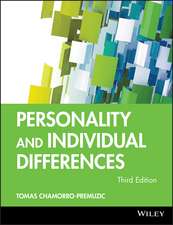The Social Psychology of Intractable Conflicts: Celebrating the Legacy of Daniel Bar-Tal, Volume I: Peace Psychology Book Series, cartea 27
Editat de Eran Halperin, Keren Sharviten Limba Engleză Hardback – 10 iul 2015
| Toate formatele și edițiile | Preț | Express |
|---|---|---|
| Paperback (1) | 723.56 lei 6-8 săpt. | |
| Springer International Publishing – 15 oct 2016 | 723.56 lei 6-8 săpt. | |
| Hardback (1) | 729.53 lei 6-8 săpt. | |
| Springer International Publishing – 10 iul 2015 | 729.53 lei 6-8 săpt. |
Din seria Peace Psychology Book Series
- 18%
 Preț: 779.26 lei
Preț: 779.26 lei -
 Preț: 361.05 lei
Preț: 361.05 lei - 15%
 Preț: 639.25 lei
Preț: 639.25 lei - 18%
 Preț: 788.54 lei
Preț: 788.54 lei - 15%
 Preț: 699.28 lei
Preț: 699.28 lei - 15%
 Preț: 646.62 lei
Preț: 646.62 lei - 18%
 Preț: 1690.13 lei
Preț: 1690.13 lei - 15%
 Preț: 645.28 lei
Preț: 645.28 lei - 24%
 Preț: 1044.84 lei
Preț: 1044.84 lei - 18%
 Preț: 945.14 lei
Preț: 945.14 lei - 15%
 Preț: 649.54 lei
Preț: 649.54 lei -
 Preț: 386.39 lei
Preț: 386.39 lei - 15%
 Preț: 697.82 lei
Preț: 697.82 lei - 15%
 Preț: 591.14 lei
Preț: 591.14 lei - 18%
 Preț: 1222.94 lei
Preț: 1222.94 lei - 15%
 Preț: 644.82 lei
Preț: 644.82 lei - 15%
 Preț: 649.22 lei
Preț: 649.22 lei - 15%
 Preț: 697.65 lei
Preț: 697.65 lei -
 Preț: 388.72 lei
Preț: 388.72 lei - 15%
 Preț: 647.08 lei
Preț: 647.08 lei - 24%
 Preț: 967.02 lei
Preț: 967.02 lei - 15%
 Preț: 638.89 lei
Preț: 638.89 lei - 15%
 Preț: 650.37 lei
Preț: 650.37 lei - 18%
 Preț: 733.15 lei
Preț: 733.15 lei -
 Preț: 398.74 lei
Preț: 398.74 lei - 15%
 Preț: 644.30 lei
Preț: 644.30 lei - 18%
 Preț: 1116.57 lei
Preț: 1116.57 lei -
 Preț: 365.05 lei
Preț: 365.05 lei - 15%
 Preț: 643.99 lei
Preț: 643.99 lei - 18%
 Preț: 1116.26 lei
Preț: 1116.26 lei - 18%
 Preț: 1381.26 lei
Preț: 1381.26 lei - 18%
 Preț: 1595.75 lei
Preț: 1595.75 lei - 18%
 Preț: 779.89 lei
Preț: 779.89 lei
Preț: 729.53 lei
Preț vechi: 889.68 lei
-18% Nou
Puncte Express: 1094
Preț estimativ în valută:
139.60€ • 146.12$ • 116.19£
139.60€ • 146.12$ • 116.19£
Carte tipărită la comandă
Livrare economică 31 martie-14 aprilie
Preluare comenzi: 021 569.72.76
Specificații
ISBN-13: 9783319178608
ISBN-10: 3319178601
Pagini: 275
Ilustrații: XII, 214 p. 2 illus., 1 illus. in color.
Dimensiuni: 155 x 235 x 20 mm
Greutate: 0.5 kg
Ediția:2015
Editura: Springer International Publishing
Colecția Springer
Seria Peace Psychology Book Series
Locul publicării:Cham, Switzerland
ISBN-10: 3319178601
Pagini: 275
Ilustrații: XII, 214 p. 2 illus., 1 illus. in color.
Dimensiuni: 155 x 235 x 20 mm
Greutate: 0.5 kg
Ediția:2015
Editura: Springer International Publishing
Colecția Springer
Seria Peace Psychology Book Series
Locul publicării:Cham, Switzerland
Public țintă
ResearchCuprins
Preface.- Part 1 Bar-Tal's Theory of Intractable Conflicts.-1. Intractable conflict: How can it be solved? The theory of Daniel Bar-Tal.- 2. Can there be a general theory of intractable conflict?.-Part 2 Perspectives on Ethos of Conflict and Collective Memory.- 3. “Ethos of conflict” and beyond: Differentiating social representations of conflict in different contexts.- 4. Ethos of conflict: A system justification perspective.- 5. The collective remembering of conflict and its role in fueling an ethos of intractable conflict in society.- Part 3 Specific Societal Beliefs and their Implications.- 6. Victims under siege: Lessons for Polish-Jewish relations and beyond.- 7. Conflict irresolvability and collective inaction in intractable intergroup conflict.- 8. Dealing with in group committed atrocities: Moral responsibility and group-based guilt.- Part 4 The Emotional Aspect of Intractable Conflicts.- 9. Fear and hope in intractable conflicts: The automatic vs. reflective bases of collective emotional orientation.- 10. Collective angst and intractable conflicts: How concern for the ingroup’s future vitality shapes adversarial intergroup relations.- 11. Expanding the toolkit: neuroimaging and intergroup conflict.- Part 5 From the Lab to the Field: Promoting Peace with Psychological Tools.- 12. Dismantling the ethos of conflict: Strategies for improving intergroup relations.- 13. Socio-psychological Barriers to Peacemaking and Overcoming Them: A Review of New Psychological Interventions.- 14. Overcoming evil: Passivity and active by standard ship to prevent group violence and create caring communities and societies.- 15. Peace psychology and ‘intractable’ conflicts: Identifying peace building tools.
Notă biografică
Keren Sharvit is a lecturer in the Program for Peace and Conflict Management Studies and the Department of Psychology at the University of Haifa. She received her Ph.D. from Tel Aviv University in 2008 and completed postdoctoral training at the Swiss Center for Conflict Research, Management and Resolution, Hebrew University of Jerusalem and the Department of Psychology, University of Maryland, College Park. Her research concerns societal belief systems that develop in times of intractable conflict and their role in assisting processes of coping with distress resulting from exposure to violence on the other hand and in facilitating avoidance of unpleasant emotional experiences resulting from harmful behavior toward the rivals on the other hand. In studying these processes her research touches on processes of motivated reasoning and emotion regulations and their societal implications in the context of intractable conflict. Her work on these topics has been published in journals such as JCR, JPR and EJSP.
Eran Halperin is an associate professor at the new school of psychology at the IDC, Herzliya. He received his Ph.D. from the University of Haifa in 2007 (summa cum laude) and completed postdoctoral training (through a Fulbright Scholarship) at the Department of Psychology, Stanford University, in 2008. He serves as an associate editor of the international journal of Political Psychology and in 2012 was awarded the Erikson award for early career achievements in the field. Dr. Halperin’s main line of research focuses on the role of emotions and emotion regulation in determining public opinion towards peace and equality, on the one hand and towards war and discrimination, on the other. In addition, he is interested in the psychological roots of some of the most destructive political ramifications of intergroup conflicts (e.g., intolerance, exclusion and intergroup violence). The unique case of Israeli society in general and theIsraeli-Palestinian conflict in particular, motivates his work and inspires his thinking. His recent work on these issues has been published in Science. Additionally, in recent years, he has published articles in journals such as JPSP, JESP, Psychological Science, JCR, BJPS, Political Psychology and JPR.
Eran Halperin is an associate professor at the new school of psychology at the IDC, Herzliya. He received his Ph.D. from the University of Haifa in 2007 (summa cum laude) and completed postdoctoral training (through a Fulbright Scholarship) at the Department of Psychology, Stanford University, in 2008. He serves as an associate editor of the international journal of Political Psychology and in 2012 was awarded the Erikson award for early career achievements in the field. Dr. Halperin’s main line of research focuses on the role of emotions and emotion regulation in determining public opinion towards peace and equality, on the one hand and towards war and discrimination, on the other. In addition, he is interested in the psychological roots of some of the most destructive political ramifications of intergroup conflicts (e.g., intolerance, exclusion and intergroup violence). The unique case of Israeli society in general and theIsraeli-Palestinian conflict in particular, motivates his work and inspires his thinking. His recent work on these issues has been published in Science. Additionally, in recent years, he has published articles in journals such as JPSP, JESP, Psychological Science, JCR, BJPS, Political Psychology and JPR.
Textul de pe ultima copertă
Dr. Daniel Bar-Tal is one of the most influential scholars in the study of the social-psychological aspects of intractable conflicts. He has made an immense contribution to the fields of social and political psychology by studying the development, in times of intractable conflict, of a socio-psychological infrastructure that consists of shared societal beliefs of ethos of conflict and collective memory. This volume, the first of two honoring the legacy of Dr. Bar-Tal, explores Dr. Bar-Tal’s theory of a specific social-psychological infrastructure that develops from cultures immersed in intractable conflicts.
Containing chapters by many leading social, political, and peace psychologists, this volume demonstrates the influence and contribution of Dr. Bar-Tal’s work to recent developments in the study of the social-psychological aspects of intractable conflicts. It explores the contents of the socio-psychological infrastructure, the processes through which these contents are acquired and maintained, their functions, the societal mechanisms that contribute to their institutionalization, as well as their role in the crystallization of social identity and development of a culture of conflict. Significantly, intractable conflict is presented here as a system of processes that reinforce each other and support the pathological growth of the conflict.
By demonstrating that it can be applied to various kinds of intractable conflicts in various places of the world, the volume argues that the theory is transferable and universal. Moreover, the volume aims to exhibit new connections and integrations between Dr. Bar-Tal's theories and other prominent theoretical frameworks in social and political psychology. Presenting both a comprehensive overview of works that have been influenced by Dr. Bar-Tal's theories and research, as well as a wide gate to future studies that will connect Dr. Bar-Tal’s work to recent theoretical developments in relateddomains, Understanding the Social Psychology of Intractable Conflicts: Celebrating the Legacy of Daniel Bar Tal is an important text for all those interested in developing a sustainable, peaceful world.
Containing chapters by many leading social, political, and peace psychologists, this volume demonstrates the influence and contribution of Dr. Bar-Tal’s work to recent developments in the study of the social-psychological aspects of intractable conflicts. It explores the contents of the socio-psychological infrastructure, the processes through which these contents are acquired and maintained, their functions, the societal mechanisms that contribute to their institutionalization, as well as their role in the crystallization of social identity and development of a culture of conflict. Significantly, intractable conflict is presented here as a system of processes that reinforce each other and support the pathological growth of the conflict.
By demonstrating that it can be applied to various kinds of intractable conflicts in various places of the world, the volume argues that the theory is transferable and universal. Moreover, the volume aims to exhibit new connections and integrations between Dr. Bar-Tal's theories and other prominent theoretical frameworks in social and political psychology. Presenting both a comprehensive overview of works that have been influenced by Dr. Bar-Tal's theories and research, as well as a wide gate to future studies that will connect Dr. Bar-Tal’s work to recent theoretical developments in relateddomains, Understanding the Social Psychology of Intractable Conflicts: Celebrating the Legacy of Daniel Bar Tal is an important text for all those interested in developing a sustainable, peaceful world.
Caracteristici
Works towards a transferable, generalized psychological theory of intractable conflicts Presents new connections and integrations between a theory of intractable conflicts and other prominent theoretical frameworks in social and political psychology A tribute to the legacy of Daniel Bar-Tal, demonstrating his influence and contribution to the study of the social-psychological aspects of intractable conflicts








